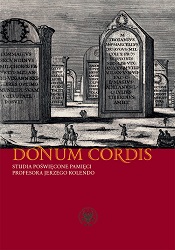Tajemniczy greckojęzyczny informator Tacyta?
Tacitus’ mysterious Greek-speaking informant?
Author(s): Radosław Andrzej Gawroński
Subject(s): Archaeology
Published by: Wydawnictwa Uniwersytetu Warszawskiego
Keywords: Jerzy Kolendo; archaeology; Poland; Europe; University of Warsaw; Polish Academy of Sciences
Summary/Abstract: The author examines the credibility of Tacitus’ account of the military equipment of the Aesti tribe, accordingto which they were supposed to have used clubs more often than iron weapons. There is a hypothesis suggestingthat Tacitus used the word fustis to describe fi ghting axes found in the inventories of burial complexes ofthe West Balt culture. The problem is that the Latin noun fustis used by Tacitus denoted only a stick or club. Theauthor argues that only in the Greek language the same words were used to designate clubs, maces and axes.A mace head found in Dura Europos considered together with a certain fragment of Arrian’s Ars Tactica testifies to the fact that the Romans were using the Greek word πέλεκυς, initially signifying axes, to describe macesor clubs. This leads to the conclusion that Tacitus’ original source was written in Greek. When interpreted thisway, the fragment about the military equipment of the Aesti perfectly matches earlier studies and refl ects realityaccurately. Thus, it is all the more probable that the original Greek description of the customs of the Aesti wasbased on the author’s own observations.
Book: Donum cordis. Studia poświęcone pamięci Profesora Jerzego Kolendo
- Page Range: 111-115
- Page Count: 4
- Publication Year: 2019
- Language: English, Polish, German
- Content File-PDF

